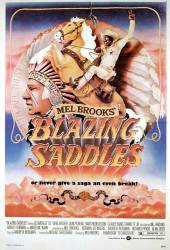Trivia: As a "spoof", Blazing Saddles deliberately included some obvious errors. But one thing impressed me in this film. Saloon singer Madeline Kahn/Lili Von Shtupp sings "I'm Tired", accompanied by six musicians in an orchestra pit in front of the stage. In many westerns a saloon singer is backed by a full orchestra that cannot be seen (for example Marlene Dietrich/Frenchie in Destry Rides Again, whom Madeline Kahn is parodying). So, perhaps inadvertently, Mel Brooks actually got something right.
Trivia: As Sheriff Bart and The Waco Kid are first getting acquainted, The Kid demonstrates how fast he is by snatching a chess piece from the board before Bart can grab it. Even though Bart plainly captures the chess piece in both his hands, he is stunned to find the piece missing when he opens his hands again a moment later (all in the same shot). No special effects were necessary, because actor Cleavon Little used a simple tabletop magic illusion: As he clapped his hands together around the chess piece and drew it back from the table for a split second, he smoothly dropped the piece into his lap and then immediately opened his hands for the surprising reveal. (00:36:02 - 00:36:28)






Chosen answer: Reverend.
MasterOfAll